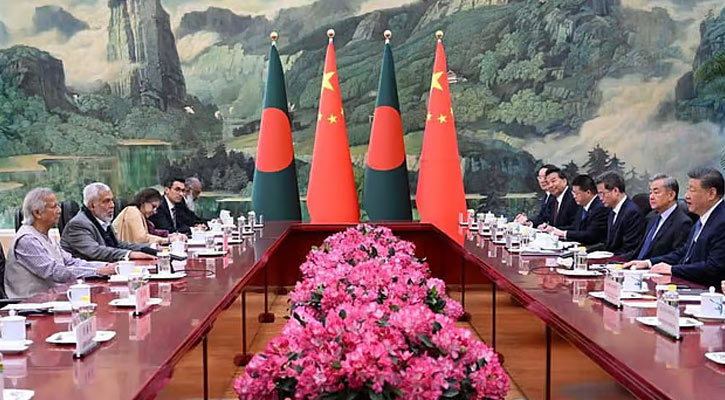After completing a four-day official visit, Interim Government's Chief Advisor Dr Muhammad Yunus returned to Bangladesh from China on Saturday night (March 29). Experts have described his visit as multifaceted and beneficial for Bangladesh. They believe Dr Yunus successfully concluded his visit, securing significant investments, loans, and grants from China and a commitment to implementing the Teesta project.
Let's take a quick look at what Bangladesh has gained from Dr Yunus' visit:
1. $2.1 Billion Commitment
During the visit of Chief Advisor Dr Muhammad Yunus, Bangladesh secured commitments of $2.1 billion in investments, loans, and grants from the Chinese government and companies. Around 30 Chinese companies pledged to invest $1 billion in Bangladesh's Special Chinese Industrial Economic Zone.
Additionally, China will provide approximately $400 million in loans for the modernization of Mongla Port. Another $350 million has been allocated for the development of the Chinese Industrial Economic Zone, along with $150 million for technical assistance. The remaining funds will be given as grants and other loan assistance.
2. Tariff and Quota-Free Facilities in China Until 2028
China has extended Bangladesh's existing tariff and quota-free export benefits for another two years. Previously, these benefits were set to expire in 2026, but following a meeting between Chief Advisor Dr Muhammad Yunus and Chinese Vice Premier Ding Xuexiang, China announced an extension until 2028.
3. Mango Exports to China
China has expressed interest in importing mangoes from Bangladesh, and Bangladesh is eager to export. Although Bangladesh applied to export mangoes to China six years ago, various complexities prevented its implementation.
However, Dr Yunus' visit has paved the way for mango exports to China. The export process is set to begin in May-June, increasing global demand for Bangladeshi mangoes.
4. Support for the Teesta Project
Bangladesh has long sought China's assistance in implementing the Teesta River project. During Dr Yunus' visit, China assured its support for the project.
However, Dr Yunus did not limit discussions to just the Teesta project. He also requested a 50-year master plan from China for river and water management.
5. Agreements and Memorandums of Understanding (MoUs)
During the Chief Advisor's visit, Bangladesh and China signed an agreement on economic and technical cooperation. Additionally, eight MoUs were signed between the two countries in areas including the translation and publication of classical literature, cultural heritage exchange and cooperation, news exchange, media, sports, and healthcare.

Details of the Visit
Chief Advisor Dr Muhammad Yunus arrived in China on March 26 for a four-day visit. He received a warm reception and a red-carpet welcome at the airport. On March 27, he delivered a speech at the opening session of the Boao Forum for Asia (BFA) Annual Conference 2025.
On March 28, Dr Yunus held a bilateral meeting with Chinese President Xi Jinping in Beijing. On the same day, Bangladesh and China signed an economic and technical cooperation agreement and eight MoUs.
Later, Dr Yunus participated in an investment dialogue with Chinese business leaders. He also took part in three roundtable discussions on sustainable infrastructure and energy investment, Bangladesh 2.0 production and market opportunities, social business and youth entrepreneurship, and a world with zero poverty, zero unemployment, and zero net carbon emissions.
Additionally, Dr Yunus met with China's Executive Vice Premier of the State Council Ding Xuexiang, Chinese Minister of Water Resources Li Guoying, Russian Deputy Prime Minister Alexei Overchuk, and former UN Secretary-General and BFA Chairman Ban Ki-moon.
Delegation Accompanying Dr Yunus
Dr Yunus was accompanied by Foreign Affairs Advisor Md Touhid Hossain, Energy Advisor Muhammad Fawzul Kabir Khan, Chief Advisor's High Representative Dr Khalilur Rahman, SDG Chief Coordinator at the Chief Advisor's Office Lamia Morshed, and Chief Advisor's Press Secretary Shafiqul Alam.




